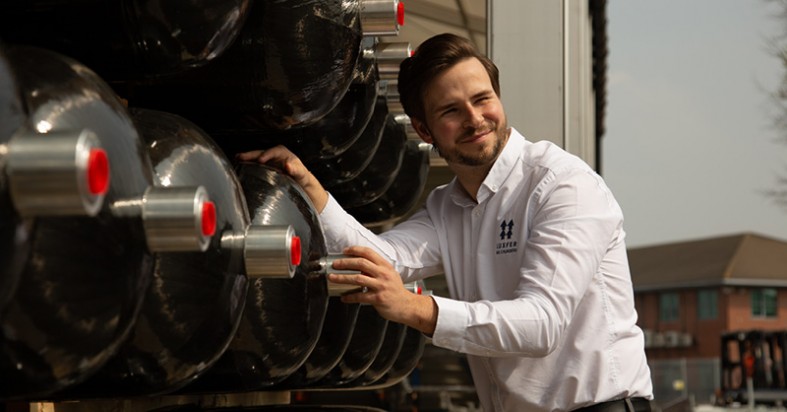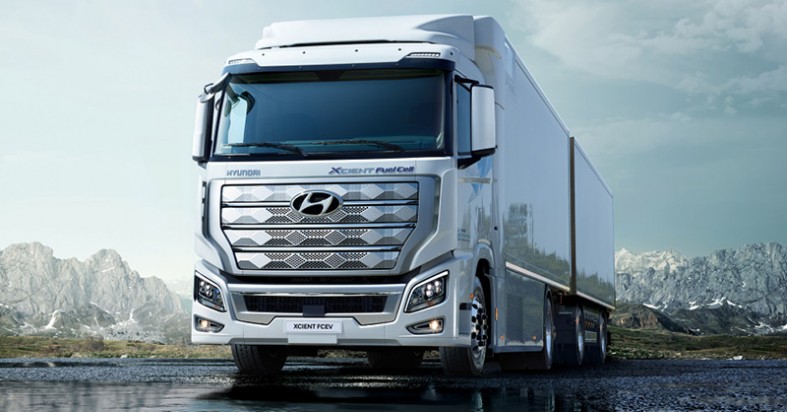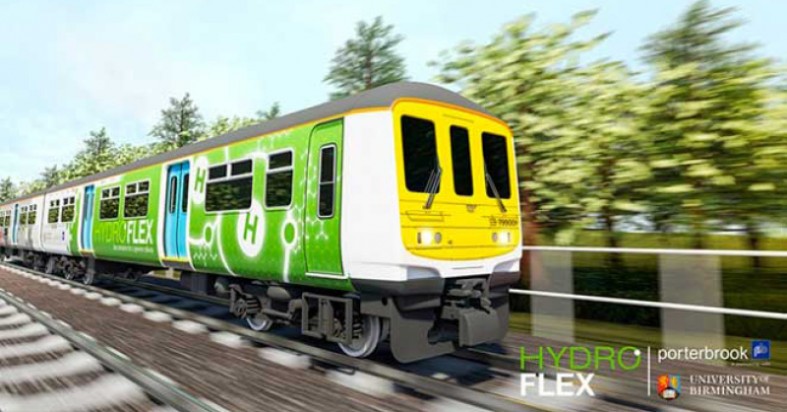US +1800 764 0366 | Europe & Middle East +44 (0)115 980 3800 | Asia-Pacific: +61 2 7227 5369

Written by: Lewis Anderson, Alternative Fuel Systems General Manager, Luxfer Gas Cylinders Europe
In 2015 Lewis
Anderson joined Luxfer Gas Cylinders as a member of the purchasing team,
unaware of how hydrogen and the demand for alternative fuels would transform
his career. Here, Lewis charts his journey with Luxfer, providing a personal
insight into how the industry is evolving.
Establishing our alternative fuels capability
Luxfer was already a global supplier to the compressed natural gas market and although the commercial opportunities in hydrogen were small, it had been an area of interest for many years.
From the late 1990s Luxfer was an innovator in hydrogen tank and valve technology, building on its heritage of being a world leader in lightweight cylinders, producing high-pressure aluminum gas cylinders since the 1930s and carbon composite cylinders since eighties.
When I joined the company, I focused on helping establish a new alternative fuel systems capability at our Nottingham manufacturing site. This would allow us to focus on hydrogen fuel system research and development and meant that we would have the infrastructure and skills in place to partner and supply customers, who like us, were early innovators. The objective was that once the e potential of hydrogen was more visible, we had the ability to meet demand.
World-first collaborations
Looking back, I’m incredibly proud to have been part of the team involved with several world firsts. These are projects that are really making positive change to the world we live in, and we have only scratched the surface of hydrogen’s potential.
Luxfer’s milestones include the world’s first commercially produced hydrogen trucks. A multi-million-pound project integrating hydrogen technology into more than 50 trucks was delivered in 2020 in partnership with Hyundai, making it the first such green fleet in history.

Hydrogen powers the 19-tonne vehicles, which is efficiently stored in seven Luxfer G-Stor™ H2 hydrogen cylinders, supplied in a state-of-the-art hydrogen system which holds 35kg of hydrogen. Each truck features a 190-kilowatt fuel cell. This storage and drive train combination provides a range of more than 400km before refuelling, which far surpasses the capabilities of battery electric truck technology.
The UK’s first hydrogen-powered train. Unveiled in June 2019, the HydroFLEX project comprises a former Thameslink electric train retrofitted to run using a hydrogen fuel system. Luxfer’s alternative fuel experts worked in close collaboration with Porterbrook and the University of Birmingham’s Centre for Railway Research, which won Department for Transport funding to support the concept. The four-cylinder hydrogen solution was developed and assembled at Luxfer’s UK alternative fuel facility, and in September 2020, the train hit the mainline for the first time.

Offering ‘instant infrastructure’
The hydrogen industry accelerated from 2018, thanks to funding and investments pledged by governments and corporations to make green fuels more accessible. This continues to encourage OEMs (Original Equipment Manufacturers) to launch hydrogen powered platforms.
However, although for some time hydrogen has been identified as among the cleanest fuels available, the challenge is to deploy and scale up the required infrastructure to support the refuelling of these vehicles. And so another innovation, based upon the company’s legacy in bulk gas transport, is making ‘instant infrastructure’ a reality.
Last year, we announced an important partnership between Octopus Hydrogen and Luxfer to make heavy goods transportation and the aviation industries cleaner and greener.
Founded upon the expertise and track record of our alternative fuel teams in Australia and North America, who have developed and supplied bulk gas transport solutions, we have designed Multiple Element Gas Containers (MEGC). These 40ft long units can transport over 1 tonne of hydrogen from the point of production to the point of use.
Nurturing the hydrogen talent of tomorrow
As hydrogen promises to be a critical fuel to reduce carbon emissions and improve air quality, I’m proud of the role I am playing, and I believe we have only scratched the surface of hydrogen’s potential.
I was appointed Alternative Fuel Systems General Manager in 2020, with responsibility to nurture and develop our alternative fuel team. This involves:
- bringing in staff at all levels, including several apprentices every year
- equipping the team with the skills and understanding to thrive in an industry that is still very new and progressive
- continuing to bring innovative products, solutions and service to our customers.
Looking ahead, we have a sustained and shared focus on collaborating with partners and the local community, alongside supporting our growing